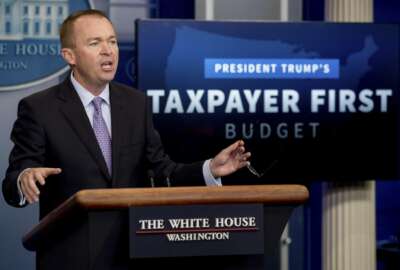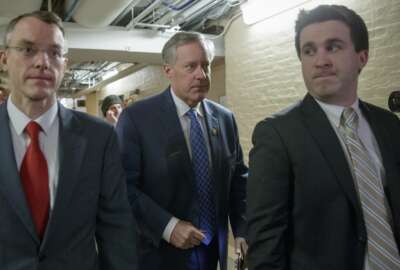
How one House Democrat wants to push back against cuts targeting federal employees
Rep. Steny Hoyer (D-Md.) said he will make the case to fellow lawmakers that it’s the wrong time to cut federal employee benefits as the unemployment rate is low.
To say Rep. Steny Hoyer (D-Md.) is disappointed in President Donald Trump’s 2018 budget request would be an understatement.
The House minority whip’s level of frustration has reached new heights with what he calls the continued attacks on federal employees.
“I think it’s probably the most draconian budget submitted to Congress, certainly in the 36 years I’ve been here and some people say in more than a half century,” Hoyer said in an interview with Federal News Radio. “As it relates to federal employees, it’s a continuation of the assault that has been made on federal employees over the last six-plus years by the Republican majority, and in this case now, the president of the United States.”
Hoyer said he plans to push back against the proposed cuts to federal employee benefits with a slightly different approach.
Instead of just explaining why he believes these proposed benefit cuts are unfair and unjust, Hoyer will focus on the unemployment rate dropping to 4.4 percent in April.
“Essentially economists would say we are at a full employment situation in the country, which means the seller of personal services, i.e. people seeking a job, are in a sellers’ market because competition is tough,” he said. “I think we could make the argument that you have a lot of people in the federal government who are eligible to retire and we need to be in a position where we can recruit and retain the quality people to do the kind of services that will ensure our national security as well as our national economic growth.”
Hoyer said the government must be competitive in the labor market for workers.
“If we continue to reduce their pay and benefits, which have been reduced by $182 billion over the last few years, we will be unable to recruit the kind of people we need to have the quality of services the American people want and need,” he said. “I hope we will be joined by a lot of our Republican friends who will make the judgment that yes we need to treat our employees in a competitive way. I think we are doing that in terms of retirement and health benefits, but we are not doing it in terms of salary. I think the package together needs to be assessed and we shouldn’t cut the benefits package when the salary package is not competitive in many of the disciplines necessary to serve the American people.”
The budget proposes four changes:
- An increase in employee contributions by 1 percent each year for the next six years;
- An elimination of the cost-of-living adjustment (COLA) for current and future Federal Employee Retirement System (FERS) participants and cutting the COLA by 0.5 percent for Civil Service Retirement System (CSRS) participants of what the typical formula currently allows;
- Basing future retirement benefits on the average of an employee’s highest five years of salary. Currently, retirement benefits are based on an employee’s length of service, salary and highest three-year average salary;
- Eliminate supplemental payments to employees who retire before age 62.
Federal financial experts are most worried by two specific proposals: increasing employee contributions and eliminating the COLA for FERS participants.
These changes, they say, may force current employees to delay their retirements in order to put more money in the Thrift Savings Plan (TSP), and they would certainly decrease an employee’s monthly take-home pay with higher annuity contributions. Combined, these proposals have the potential to cause real hardship, said Art Stein, a financial planner and investment manager.
Hoyer said he’s most concerned about the lack of pay comparability between the Defense Department and the civilian workforce.
The administration is proposing a 2.1 percent pay raise for the military and a 1.9 percent pay raise for civilian workers.
“One of the worst is the elimination of the COLA for FERS retirees, which means once you retire you are frozen notwithstanding the fact that the cost of living adjustment goes up. Under FERS, they still get Social Security, that is probably by far the lesser amount of their retirement package and therefore if you freeze FERS, what you simply do is every year their standard of living will decrease. That is the most harmful of the changes,” he said. “They are suggesting a substantial increase in the contribution toward retirement. There will be debate about that about how much the employee should contribute and how much the employer should contribute. But if you increase the amount the employee pays, the employee takes home less, and that, in effect, is tantamount to a tax increase for that employee. Of course, my Republican friends speak long and hard, and always about making sure we decrease taxes on people.”
The Trump administration also proposed to decrease the workforce at 11 cabinet agencies with the Agriculture, Interior and Treasury departments seeing the largest reductions.
Hoyer said he’s less concerned about the actual numbers, and more about whether the workforce is capable of meeting the goals of the executive and legislative branches.
“If you just cut federal employees without cutting their responsibilities and the objectives you want them to achieve, that is not an honest way of doing business,” he said. “Arguing you can do this thing with 100 people as opposed to 110 people, is one thing, But just to say we will reduce 10 people without reducing the jobs they are required to do, then that doesn’t make sense.”
Hoyer said he has not met with the Trump administration yet to discuss his concerns, but expects to in the coming weeks.
Hoyer may have a difficult time getting through to his colleagues. House lawmakers held a recent hearing and promised to reform the federal civil service.
Copyright © 2025 Federal News Network. All rights reserved. This website is not intended for users located within the European Economic Area.
Jason Miller is executive editor of Federal News Network and directs news coverage on the people, policy and programs of the federal government.
Follow @jmillerWFED
Related Stories

Republicans gearing up for major changes to federal pay and benefits




